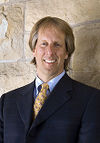Rod Beckstrom
Rod Beckstrom is the President and CEO of ICANN and an Advisor at Uniloc.[1] He serves on the boards of the Environmental Defense Fund, named by Fortune Magazine as one of the seven most powerful boards in the world, and the Jamii Bora Trust, an African micro-lending group. [2]
 |
 |
| Country: | USA |
| Website: | |
| Facebook: | |
| LinkedIn: | |
| Twitter: |
Beckstrom is also a writer, and has co-authored four books, including the best-seller The Starfish and the Spider: The Unstoppable Power of Leaderless Organizations, which provides a model for analyzing organizations, leadership styles, and competitive strategy. The Starfish and the Spider has been translated into 16 languages.[3]
On August 16, 2011, Rod announced via Twitter that he would be resigning from his position as President and CEO of ICANN in July 2012,[4] at the end of his three year contract. ICANN confirmed the news with an official press release later that day, highlighting his past two years with the organization.[5] He first took up the post in July, 2009.
Work with ICANN
Beckstrom was appointed President and CEO of ICANN at the conclusion of ICANN's 35th international meeting in Sydney, Australia, in June 2009.[6] Mr. Beckstrom's performance has been met with criticism by a wide ranging group of ICANN insiders, but he has also overseen the organization during some of its busiest and most progressive work. Following the announcement of his departure, a PDF was released that highlights his achievements over the previous two years.
Achievements
The PDF of achievements can be found here. Those achievements include:
- Signed the Affirmation of Commitments
- Implemented DNSSEC in the Root Zone
- Perfectly synchronized IANA operations
- Supported gTLD development, including working with government detractors
- Saw IDNs implemented into the root, including both traditional and simplified Chinese
- Encouraged the expansion of the multi-stakeholder model
- Initiated relationship with Interpol
- Increased sponsorship for ICANN meetings
Mr. Beckstrom is also known for starting the "Music Night" tradition at ICANN meetings, where karaoke and a live band loosen up ICANN attendees mid-week.[7]
Criticism
Many ICANN attendees have questioned his ownership over the aforementioned achievements and instead point to a list of dubious decisions and alarming statistics. Some of his more widely criticized moves include:
- In May, 2010, Rod Beckstrom brought on Elad Levinson as a consultant, and later promoted him to VP of Organization Effectiveness. Mr. Levinson's background as a self-help, weight loss, and Buddhist-inspired psychologist and guru riled many ICANN watchers.[8] Some interpreted it as Rod Beckstrom bringing on a personal teacher into a position of authority within the organization, and were especially irritated over the creation of new VP positions when other existing positions remain unfilled.[9] Internal emails from the GNSO show disagreement over whether or not the hire was appropriate, including a defense of Mr. Levinson's effectiveness that is countered with disappointment over the hire.[10]
- Rod Beckstrom has been accused of being paid too much.[11] He had released information regarding his salary, which stands at $750,000 per year USD plus bonuses, at risk compensation, and benefits.[12]
- Rod Beckstrom was publicly derided by both Maria Farrell and Lesley Cowley at the public forum at ICANN San Francsico.[13] Ms. Farrell first took the mic to accuse the organization of chasing away its experienced staff members, herself included, and lament the "hollowing out of expertise" therein. Her comments were met with sustained applause. Rod Beckstrom responded that turnover was below 15%, which is quite good for a tech-oriented organization. Lesley Cowley later took the mic to point out that the turnover rate for senior staff members was likely significantly higher, around 78%.[14] Audio of that forum can be found here, with the aforementioned interaction beginning around 23:10.
- He has been criticized for attaching his name to what amount to organizational achievements, or taking credit for his predecessor and other peoples' work. These achievements include the implementation of IDNs, and the approval of the Applicant Guidebook for new gTLDs.[15]
Career History
Government Work
Mr. Beckstrom was appointed President and CEO of ICANN 4 months after resigning as Director of the U.S. Department of Homeland Security's National Cybersecurity Center in March, 2009.[16] He served as Director for the Cybersecurity Center for just one year. His departure from the Department of Homeland Security was marked by his criticism of the National Security Agency's tactics in his letter of resignation.[17] That letter can be read here.
Private Sector
Prior to his 1 year stint with the Department of Homeland Security, he spent 1 year as the Chairman of TWIKI.net.
From 2001 to 2007, he was the Chairman for Global Peace Networks and an Investor and Advisor for American Legal Net. From 2005 to 2006, he served as Chairman for Carbon Investments; from 1991 to 2001, as Chairman of Privada; and from 1985 to 1999, as CEO for CATS Software.[18]
Rod founded CATS Software in 1985 at the age of 24, originally working out of a garage apartment. The venture subsequently grew into global enterprise with offices in New York, London, Tokyo, Geneva, Sydney, Palo Alto, Los Angeles, and Hong Kong. It eventually went public and sold.[19]
Mr. Beckstrom also helped found Mergent Systems, which later sold for $200 million USD.[20]
Other Work
Mr. Beckstrom co-founded a global peace network of concerned CEOs to start Track II diplomatic efforts between India and Pakistan in 2003. Their work opened up greater trade and communication between the countries and helped resolve one of their escalating conflicts.
Rod Beckstrom is a passionate environmentalist, and is notably a board member for the Environmental Defense Fund[21]
Education
Rod received a BA in Economics with Honors and Distinction from Stanford University, and an MBA from the Stanford Graduate School of Business. He also studied Finance and Banking as a Fulbright Scholar at the University of St. Galen in Switzerland.[22]
References
- ↑ ICANN.org Bio
- ↑ Rod Beckstrom Bio
- ↑ ICANN.org
- ↑ Rod Beckstrom Named ICANN CEO
- ↑ News.Dot-Nxt.com
- ↑ DomainIncite.com
- ↑ News.Dot-Nxt.com
- ↑ GNSO.ICANN.org
- ↑ Nigel.ie
- ↑ DomainNameNews.com
- ↑ Nigel.ie
- ↑ MariaFarrel.com
- ↑ News.Dot-Nxt.com
- ↑ Rod Beckstrom resigns as director of National Cybersecurity Center
- ↑ Forbes.com
- ↑ ICANN.org Bio
- ↑ Beckstrom.com
- ↑ ICANN.org